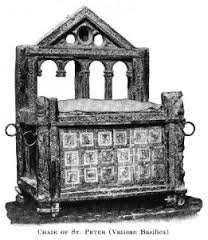“Thou art Peter, and upon this rock I will build my church, and the gates of hell will not prevail against it. I will give you the keys of the kingdom of heaven, and whatever you bind on earth shall be bound in heaven, and whatever you loose on earth shall be loosed in heaven” (Matthew 16:18-19)
When Jesus made this prophecy, he did not guarantee there would be no loose stones in the Church he was building. He promised only that this Church would not finally crumble and perish, as it has not. But there have been many loose stones. The first loose stone was terribly loose, the traitor Judas. As part of the foundation of the church, that immense stone was easily replaced by the election of the apostle Matthias. Then there were some very large loose stones in Peter himself when three times he denied knowing Jesus. But God turned the loose stones that had been in Peter into an unshakably massive boulder at Rome that has supported the superstructure of the universal Church for two thousand years.
Then there are the loose and crumbling stones of moral turpitude. They have often appeared like gaping great holes in the walls of Christ’s church when the princes of the church allied themselves with the princes of the world. In the Middle Ages not all, but a sizable number of popes, bishops, and priests lost their moral compass and began to think like greedy merchants and corrupt politicians. The selling of indulgences brought the church great wealth but greater scandal. The personal lives of some of the popes who led armies and inspired Crusades were shamelessly immoral, to be sure.
More loose stones. The Church has been subjected to the powerful onslaught of heresies and schisms. First, the break between the Roman and the Byzantine empires left wounds of unity that are not healed even sixteen centuries later. The unity of the church was broken again by the heresies of the Middle Ages. And with the Reformation throughout Europe, it seemed to some that the days of the universal Catholic Church might indeed be numbered. Then came the rise of the secularist philosophers who promoted atheism and skepticism so effectively that even the liberal churches of Christendom have shown signs of cracks in their foundations and the threatened collapse of mainstream Protestantism.
The modern Catholic Church has deep divisions within it as liberal and conservative theologians tear up each other’s tracts. Cafeteria Catholicism has gained ground at an alarming rate. Some of the laity, increasingly confused by the weak leadership of their bishops, the opposing schools of theology, and the rising incidence of sexual scandals among the clergy, begin to see themselves left as the ultimate arbiters of right and wrong. Catholic politicians are willfully and wickedly quick to declare themselves opposed to the traditional teachings of the Church on many controversial matters. Leaders of some Catholic colleges are proud to invite guest speakers who are contemptuous of traditional Catholic teachings on abortion, euthanasia, same-sex marriage, etc. All these are loose stones.
Yet the building stands. Charles Darwin once said in a letter to Karl Marx (after he had been invited by Marx to openly attack religious institutions) that the more the Church is attacked, the more resilient it seems to be. Catholic “masons” suddenly appear from all directions and go to work filling in the cracks and holes with spiritual mortar. This is Christ’s Church. The Church is not just clergy. It is clergy and laity who make up the Body of Christ. As Archbishop Sheen said, and we should mark carefully his words, the Catholic Church in America will be saved by the laity. That may not be true unless the clergy find ways to unleash the laity upon their evangelical mission. And what is this mission but to preach the gospel by words and actions to an unchurched world?
“Thou art Peter, and upon this rock I will build my church, and the gates of hell will not prevail against it.” So far they haven’t … just a few loose stones everywhere it seems. The election of the next pope will tell us a great deal about the future of the Church. More ubiquitous crumbling or more spiritual masons furiously filling in the cracks and holes.












